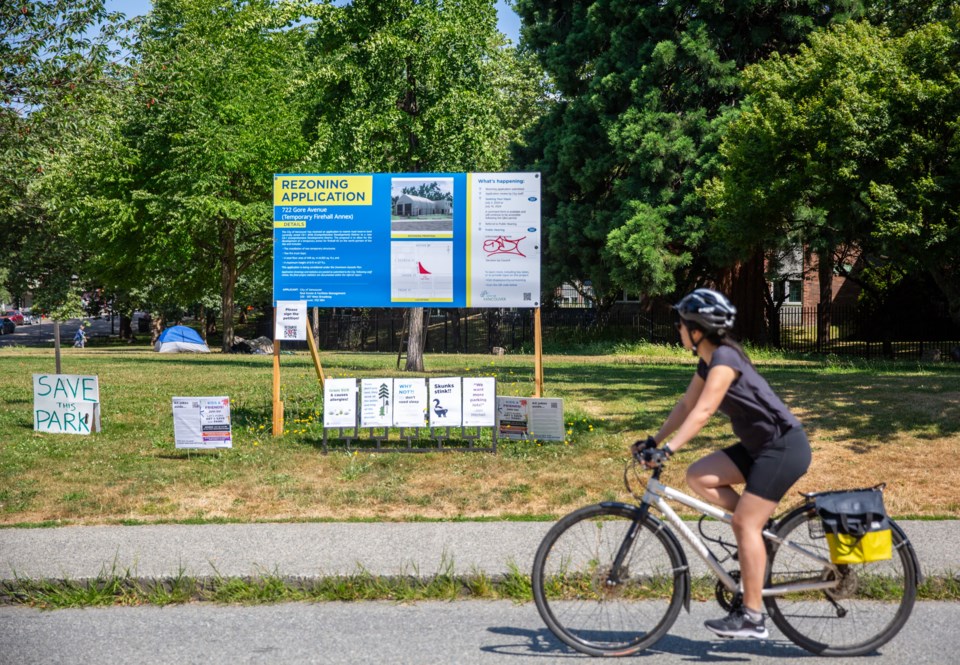The call from Strathcona residents to have a chunk of green space in their neighbourhood given formal designation as a park got another step closer after Â鶹´«Ã½Ó³»council directed staff to report back on the best way to achieve that goal.
The green space is located at Gore and Union streets and is considered a right-of-way. The city had plans to add a temporary fire hall annex to the property. But residents pushed back and the city is now looking at other sites in the area for the annex.
A petition led by Strathcona resident Dana Deschene followed by a motion from park board commissioner Tom Digby triggered Coun. Pete Fry to request council’s support for the space, and that it be formally recognized as a park.
“The ask here is to have staff report back on considerations for how we could actually assign this as a park so that it is protected and that it's no longer just a vacant right-of-way that could be subsumed at any whim,” said Fry, a Strathcona resident.
In his motion to council, Fry outlined the history of the space and its importance to the community. Fry described the property as a vestige of the successful community-led fight in the early 1970s to stop the freeway through Chinatown, Hogan’s Alley and Strathcona.
An arborist’s report conducted by Arbortech Consulting identified 18 trees on the site, including a rare giant Sequoia, along with 26 “neighbour trees” that abut the property and three “municipal trees” on the edge of the park.
Fry noted Strathcona was identified in a recent independent report that assessed Vancouver’s tree canopy cover as the most tree-deficit neighbourhood in the city.
Diamond Head Consulting found that Strathcona’s tree canopy was less than 10 per cent; Shaughnessy had the highest canopy cover at more than 30 per cent.
Coun. Peter Meiszner mentioned the importance of trees in Strathcona in his closing remarks, noting more development is slated for the area, including the new St. Paul’s Hospital under construction a block away from the green space.
“This isn't just in a neighbourhood with a deficit of green space, this is also in a neighbourhood that is changing, and there's going to be lots of demand for spaces of respite for the community,” Meiszner said.
'This kind of park is needed'
Council heard from Strathcona resident Meghan Winters, a professor at Simon Fraser University in the faculty of Health Sciences, where her work involvces building healthy and equitable cities.
Winters described parks near the green space — Trillium and Andy Livingstone — as “special interest” parks; they are covered in artificial turf and used by sports teams and individual athletes.
“Many people in this neighbourhood live in the smallest of apartments, in [single-room-occupancy hotels] or in social housing and co-ops at very high density, even directly adjacent to this space,” she said.
“And these residents often don't have any outdoor spaces. So we know this kind of park is needed.”
She said Strathcona needs welcoming, flexible, community-oriented spaces for gathering residents.
“Right now, the green space is used in this way,” Winters said.
“If you go by it on hot days, there's people lying under the trees. At lunchtime, there's workers breaking on the few benches that are available. And at all times, there's people walking their dogs.”
The Union Street bike route runs alongside the property, and the Nora Hendrix temporary modular housing complex is located on the opposite corner, which will eventually be redeveloped by the Hogan’s Alley Society.
Hogan's Alley
Djaka Blais, executive director of Hogan’s Alley Society, reminded council that the area was historically the hub of the Black community. Blais said the society supports formalizing the green space at Union and Gore streets as a park.
“We view this green space as a critical public asset for broader community engagement,” she said. “‘People's Park’ can serve as a symbol of resilience and as a gathering place for cultural and educational events, and to honour the multicultural history of the neighbourhood.”
Fry’s motion did not come with a recommendation of a name for the park, although many residents have referred to it as “People’s Park.” For a short time, a professional-looking sign bearing that name was installed in the park, but was later removed by city crews.
X/@Howellings



